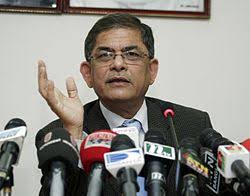
BNP Secretary General Mirza Fakhrul Islam Alamgir has expressed deep concern over what he termed the government's "hasty announcement" of the draft Telecom Network and Licensing Reform Policy 2025, describing it as a move that could disproportionately favor large mobile operators while marginalizing SMEs and local entrepreneurs.At an emergency press conference held at 1pm on Thursday at the BNP chairperson’s office in Gulshan, Fakhrul raised serious objections to the proposed policy, urging the government to halt its implementation until broader consultations are held.“The recent initiative by the Bangladesh Telecommunication Regulatory Commission (BTRC) to formulate a draft Telecom Network and Licensing Reform Policy 2025 has come to our attention. While the intent may be commendable, we are deeply concerned about the rush to decide on such a nationally significant issue,” said Fakhrul.
He added that the draft contains “serious flaws” that could undermine equitable and sustainable development in the telecom sector.
He said: “This policy, if implemented in its current form, will harm small and medium-sized businesses and local entrepreneurs.”
He added: “It opens the door for monopolies by lifting restrictions on cross-ownership, allowing large telecom operators to dominate multiple service areas, reducing competition and pushing smaller firms out.”
Fakhrul called upon the government to first conduct a comprehensive financial and social impact assessment and engage in participatory discussions with all stakeholders—including SMEs, experts, and consumer rights organizations—before finalizing such a far-reaching policy.
“Given the upcoming national elections, it is not appropriate to unilaterally push through such a policy at this time,” he added.
Just two hours before the draft policy was formally announced by the CEO of Bangladesh Investment Development Authority (BIDA), Chowdhury Ashik Mahmud Bin Harun, at an event at the Foreign Service Academy on Bailey Road, BNP rushed to hold its own press conference to voice opposition.
Concerns over monopoly, market domination
Highlighting specific concerns, Fakhrul warned that removing the ban on cross-ownership would allow large mobile operators to establish monopolistic control over multiple telecom services.
This, he argued, would drastically reduce market competition.
“The draft policy lacks clear directives on the responsibilities and resources of local ISPs and smaller telecom operators. In the name of deregulation, these entities could face severe financial challenges.”
He also pointed out that the policy lacks clarity on limits for foreign ownership, which could discourage investment and destabilize the sector.
Favoring large operators
Fakhrul accused the policy of being overtly biased toward large corporations.
“Merging ISP licenses and making NSP licenses dependent on spectrum will benefit only large operators. While the fixed telecom license will remain open, operators must maintain nationwide coverage and quality, which is a major challenge for SMEs,” Fakhrul said.
“Allowing major mobile operators to enter the enterprise broadband market will marginalize small players, creating monopolies and harming the overall economy. The draft clearly maintains advantages for big firms, increasing dominance instead of healthy competition,” he added.
No guidance on emerging technologies
He criticized the absence of strategic direction for emerging technologies.
“There’s no specific guidance in the policy on satellite broadband or other digital services, which could confuse potential investors,” Fakhrul said.
Risk of disputes and inequality
Fakhrul warned that vague definitions of enterprise services and a lack of clarity on the scope of fiber-based business connections for mobile operators could lead to disputes and inequality.
‘Policy should serve the people’
“BNP believes that only policies that serve all people are acceptable. We will continue to work toward digital connectivity that ensures equitable development and protects national digital security and sovereignty,” said Fakhrul.
Policy must benefit rural population
BNP Standing Committee member Dr Abdul Moyeen Khan also spoke at the press conference, emphasizing that the real beneficiaries of technological advancement should be the people.
“We support the expansion of modern technology, but we must ensure its benefits reach everyone,” he said.
He added: “Big telecom operators will get significant advantages, especially those with the capacity to invest heavily. But from what we see, the draft policy lacks provisions that guarantee benefits for the common people.”
“Affordable internet access for rural populations must be ensured. Technology like AI is changing the world—but unless its benefits reach the general public, especially in rural areas, this digital transformation will remain incomplete,” he further added.

